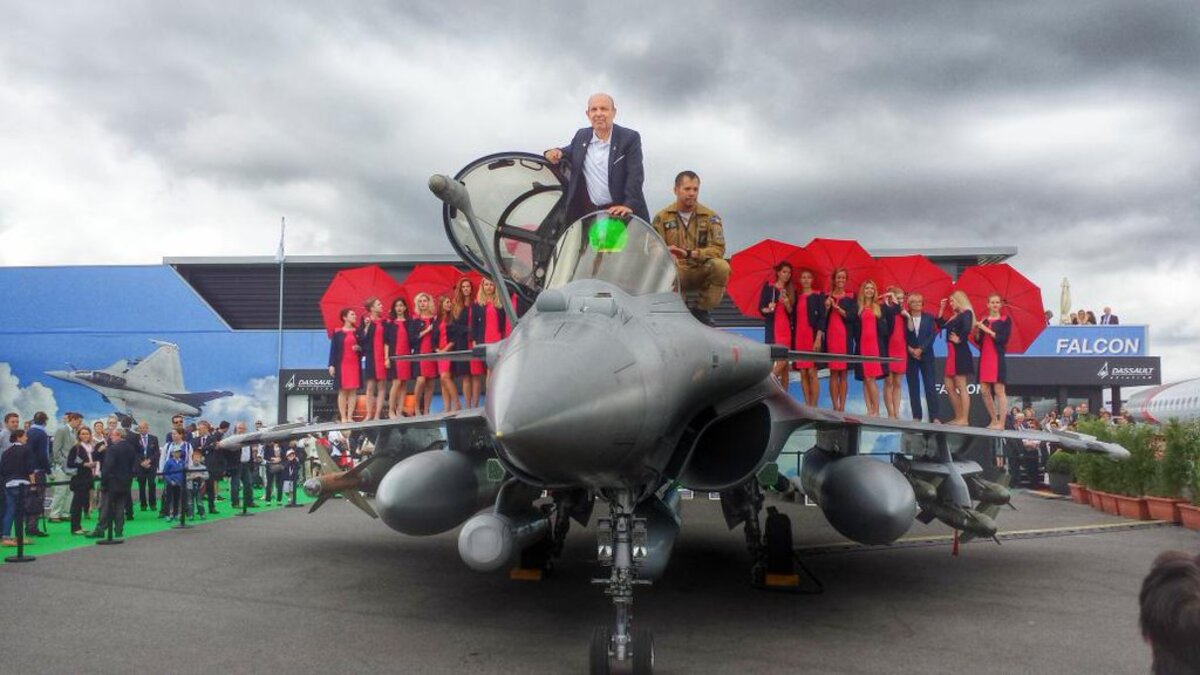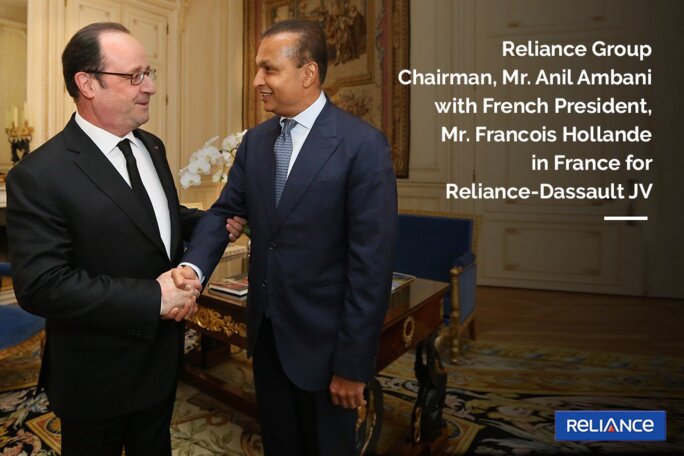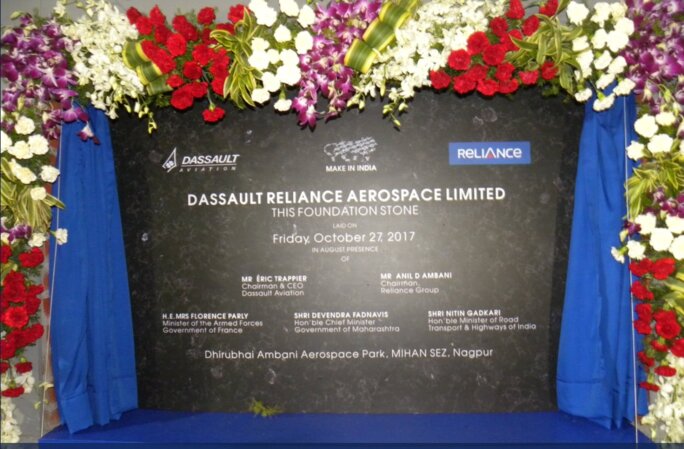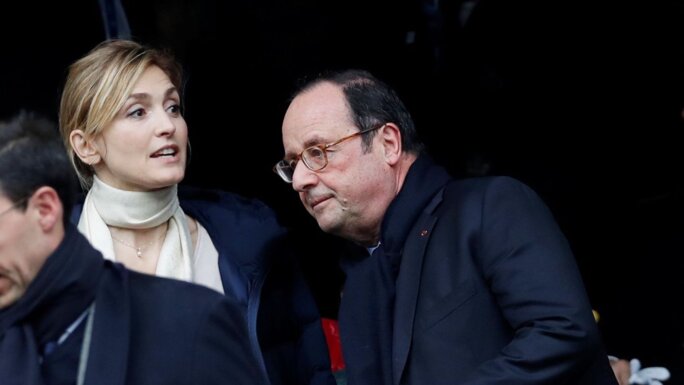As Indian Prime Minister Narendra Modi’s government prepares for an increasingly tight battle in general elections which begin on Thursday, new revelations this weekend have added to suspicions of corruption surrounding the 7.7-billion-euro sale by France to India of 36 Rafale fighter jets in a deal signed by Modi in 2016.
On Saturday, French daily Le Monde reported that a French subsidiary of India’s Reliance Group, owned by billionaire Anil Ambani, a businessman who enjoys close relations with Modi and whose conglomerate was made a local industrial partner in the Rafale deal, was accorded a write-off by the French tax authorities of more than 140 million euros it owed in unpaid taxes. The unusual generosity of the French tax administration occurred as the negotiations for the fighter jet purchase reached a critical phase.
The revelation follows the decision last week by India’s Supreme Court to hear the case for an investigation into the circumstances surrounding the deal, reversing its initial refusal last December. The court, led by Chief Justice Ranjan Gogoi, said on Wednesday its decision now was because of new evidence published in media reports, and rejected the federal government’s objection that an investigation would concern classified defence documents. The dates of the hearings have not yet been announced.
Modi has denied any wrongdoing.
One of the key questions raised over the deal was why Ambani’s Reliance Group was handed the role of local industrial partner for Rafale’s French manufacturer Dassault, despite it having no previous aeronautical expertise.
A proposed deal initiated with the Indian government prior to Modi’s election in May 2014 was for the purchase of 126 Rafale jets, to be partly built in by India’s state-owned aerospace and defence corporation, Hindustan Aeronautics Limited (HAL) which was to act as local industrial partner, in what is known as an “offset” agreement. Instead, Modi secured a new deal – negotiated in 2015 and inked by Modi and the then French president François Hollande in September 2016 – for 36 Rafale fighters, costing twice as much per unit as outlined in the earlier negotiations, with Reliance appointed as local partner in place of HAL.
For Rafale manufacturer Dassault Aviation, the deal was of major importance as it struggled to sell its multi-purpose fighter jet abroad.

Enlargement : Illustration 1

Following media revelations last year, including investigations by Mediapart, highlighting evidence of possible corruption in the deal, an official complaint was lodged last October with India’s Central Bureau of Investigation. The complaint, led by Arun Shourie, a prominent economist and former minister, together with lawyer and anti-corruption activist Prashant Bhushan and former minister Yashwant Sinha, accused Modi of “abuse of authority”, and of carrying out his public duties “dishonestly and improperly”. They also alleged that Modi’s “long-time friend and close associate”, Reliance chairman Anil Ambani, received “undue advantage” for his group which they described as being on “the point of insolvency” before the signing of the final Rafale deal.
Meanwhile, in France, anti-corruption NGO Sherpa last November filed a complaint with the financial crime branch of the French public prosecution services, the PNF, in which it cited evidence that the deal involved “potential acts of corruption, obtaining undue advantages, influence peddling, complicity in these offences, and money laundering”.
PNF chief prosecutor Éliane Houlette has yet to decide whether to open an investigation into the suspected collusion between Dassault and Reliance alleged by Sherpa. If it is launched, the probe is likely to also consider Mediapart’s revelations last year detailing the financing by Anil Ambani’s Reliance group, during the final negotiations for the Rafale deal, of a film co-produced by then-president François Hollande’s personal partner, the actress Julie Gayet.
Questioned by Mediapart last September, Hollande, who left office in 2017, said he was “not at all informed” about the film production deal with Ambani’s group. He also suggested that the involvement of Reliance as local industrial partner was imposed upon both Dassault and the French government. “We didn’t have any say in this matter,” Hollande told Mediapart. “It is the Indian government which had proposed this service group, and Dassault who negotiated with Ambani. We didn’t have the choice, we took the interlocutor who was given to us.”

Enlargement : Illustration 2

That statement prompted an immediate response from French secretary of state for European and foreign affairs Jean-Baptiste Lemoyne, who said Hollande’s comments, “render no service to anyone, and above all no service to France”.
In a supplementary report recently passed by Sherpa to the French prosecution services, and seen by Mediapart, the NGO detailed further “irregularities” in the Rafale sale concluded in September 2016. “There is reason to question the economic and political logic which governed the change in India’s requirements and criteria [editor’s note: from those] initially included in the tender, as well as the replacement of the traditional Indian manufacturer [HAL] by a dubious operator without any experience in the field of military aeronautics,” Sherpa wrote. “These practices having been made possible by a total lack of transparency concerning the conclusion of the new contract.”
The first tender to supply fighter aircraft to the Indian Air Force, issued in 2007 and won by Dassault, was for the supply of 18 “fly away” – meaning ready for immediate use – planes, plus another 108 to be built in India and which, in a technology transfer, was to involve the creation of 20,000 jobs for highly qualified staff.
Sherpa noted that in 2015, “it was publicly well known that negotiations between Dassault and HAL had reached a very advanced stage”. Indeed, at the time, Dassault issued a statement announcing that the conclusion of the contract was “95%” agreed.
“But in an astonishingly short lapse of time, and whereas the negotiations between HAL and Dassault had been advancing for eight years, the agreement was completely changed,” underlined Sherpa. “Indeed, on April 10th 2015, the Indian prime minster announced that the Indian armed forces would henceforth acquire just 36 planes from the manufacturer Dassault, in ready-to-fly condition.”
French budget minister has 'no recollection' of tax deal
A technology transfer by Dassault to India was left out of the new agreement, and, noted Sherpa, “no tender preceded this new arrangement”. The original contract’s conditions for the renewal of India’s jet fighter fleet appeared, said the NGO, “to have been purely and simply substituted”, while a retraction clause was not included – which it said was “irregular” with regard to Indian regulations governing public sector procurements. India’s intention to purchase of the 36 Rafale fighter jets was initially announced at a press conference in Paris on April 10th 2015, before the Indian Air Force had submitted its recommendations.
Concerning the replacement of HAL in the offset deal, Sherpa commented: “It is surprising to observe that within a few days of the change of the operator [local partner] in India and the contents of the contract, two new companies were created in India which would replace HAL as Dassault’s contracting partner.”
These two companies – Adani Defence Systems and Technologies Ltd, and Reliance Defence Systems Ltd – were created expressly by Dassault’s future partner Anil Ambani, whose entry into defence manufacturing activity also involved him taking a majority stake in Indian company Pipavav Defence & Offshore Engineering.

Enlargement : Illustration 3

“The choice of Reliance, a company that was established since just one year on the date of the signature [of the Rafale deal], and whose financial results for the year 2016 showed had debts of 800 million rupees [about 10 million euros], with a deficit of 1,300 rupees [about 16 million euros], raises questions,” said the Sherpa report. “Numerous documents present the poor financial state of the Reliance company, whereas the HAL company appeared to be perfectly able to meet requirements.”
Dassault has consistently stated that its partnership deal with Reliance was decided in order to conform to Modi’s policy promoting “Make in India” offset deals.
As to when, and in which conditions Dassault moved towards concluding an agreement with the Reliance Group, Sherpa’s report said that there existed “a possible collusion by Dassault in the ousting of HAL to the benefit of Reliance”. It added: “There is reason to think, having regard to the numerous statements in the Indian and international press, that it was uniquely with the aim of obtaining undue advantage for Mr Ambani that the public servant Mr Modi would have used pressure, and abused his position, to put an end to the initial contract.”
Sherpa said Dassault should have refused the partnership with Reliance, instead of running the risk of facing prosecution for “complicity in influence trafficking and favouritism, or complicity in the violation of Indian legislation concerning public sector procurement”.
The revelations published by Le Monde this Saturday add further suspicions about the conditions in which Anil Ambani’s group was chosen as local partner. The French daily reported that in October 2015, at the height of the final negotiations over the Rafale deal, Ambani’s French subsidiary Reliance Flag Atlantic France was granted a write-off of 143.7 million euros it owed to the French tax authorities.
The sum related to two demands for the settlement of unpaid taxes; one was for the period between April 2007 and March 2010 (a total of 60 million euros including fines and interest), and another was for the period between April 2010 and March 2012 (a total of 91 million euros).
Reliance Flag Atlantic France, a telecommunications company, was suspected of minimising its profits declared in France through a holding company in Bermuda. In 2013, it made a proposition to the French tax authorities to settle the initial tax demand of 60 million euros with a payment of just 7.3 million euros. That was met, reported Le Monde, with a “clear refusal by the tax administration”.
But, as Mediapart can confirm (see document below), Reliance Flag Atlantic France eventually succeeded in settling the whole of its tax debts, totalling 151 million euros, with the payment of 7.3 million euros, in an agreement dated October 22nd 2015.

Enlargement : Illustration 4

Asked how Reliance could have such a huge write-off of unpaid taxes, former French budget minister Christian Eckert, who was in post at the time of the deal, told Mediapart that he had “no recollection” of the matter. Also contacted by Mediapart, Michel Sapin, who was then French economy minister, said: “This case was not raised with me. There was no reason to do so.” For the time being, the chain of decision-making behind the write-off remains unknown.
Mystery also surrounds the funding by Reliance of Julie Gayet’s film Tout là-haut (English title, 'To the top'). The film, which tells the story of French snowboarder Marco Siffredi who died while descending the slopes of Mount Everest, was partly shot in India's Himalayan region. Gayet has repeatedly insisted that the funding – initially to be 3 million euros but which was later reduced to 1.6 million euros – had no connection with the Rafale deal, which was under negotiation at the time.

Enlargement : Illustration 5

In its documents sent to the French prosecution services, Sherpa wrote: “It appears difficult to believe that Mrs Gayet, as co-producer of the film, could have been unknowledgeable about a capital investment which conditioned the existence of the film, as well as the provenance of the funds.” It added that it would appear “difficult” not to recognise a link between Reliance Entertainment, the co-funder of Gayet’s film, and the Reliance Group that appeared in the Rafale contract, because, wrote Sherpa, “the two companies have the same name and are led by the same man: Mr Ambani”.
The January 2016 statement announcing Reliance Entertainment had agreed to part-fund Gayet’s film was made on the same day that then French president François Hollande, Gayet’s personal partner, arrived in New Delhi on a three-day visit to India, when he was to discuss the Rafale contract. The timing was described by Sherpa as “a perfect concomitance of the two events”.
-------------------------
- The French original version of this report can be found here.
English version by Graham Tearse
-------------------------
If you have information of public interest you would like to pass on to Mediapart for investigation you can contact us at this email address: enquete@mediapart.fr. If you wish to send us documents for our scrutiny via our highly secure platform please go to https://www.frenchleaks.fr/ which is presented in both English and French.
-------------------------


